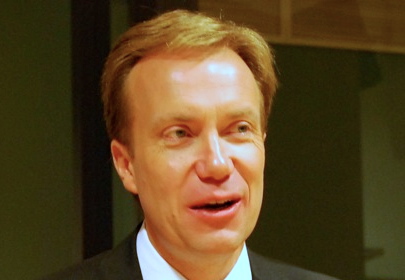Norway’s globe-trotting foreign minister, Børge Brende, was back in the Middle East this week for meetings with Israeli and Palestinian leaders after the recent elections in Israel. Brende reportedly was not optimistic after his meeting with the barely re-elected Israeli Prime Minister Benjamin Netanyahu, but as with all his other global goals amidst constant traveling, he remains driven and insisted he wasn’t giving up.

“I made it clear to Netanyahu that Israel must take the initiative to resume a political dialogue,” Brende told newspaper Dagsavisen’s correspendent in Jerusalem, Roger Hercz. “Everything must be based on a solution with two states and borders along the lines of 1967.”
It was perhaps a sign of Norway’s long involvement in the Middle East peace process that Brende was the first foreign leader to visit Israel after Netanyahu formed his new right-wing coalition government last week. The EU’s top diplomat, Federica Mogherini, was to arrive after Brende, at a time when relations between the Israelis and Palestinians are at a new low. Even US President Barack Obama said last weekend that peace would be “almost impossible” to reach during the next year, given Netanyahu’s fellow ministers who oppose a two-state solution and the ongoing political split between Palestinians on the West Bank and in Gaza.
Brende gamely met many of them, and next week he’ll be in Brussels for a meeting of the donor group for Palestine. He said he tried to ease the level of conflict and a recent wave of hateful expressions on both sides. “There won’t be any peace until that stops,” Brende told Dagsavisen.
‘Power naps’ on the go
The 49-year-old Brende (he’ll turn 50 on September 25) has learned to sleep on flights whenever he can grab the proverbial “power nap.” He thrives in the role he assumed in the fall of 2013, when Norway’s Conservative Party won national elections, or at least enough votes to form a minority coalition government. Prime Minister Erna Solberg called Brende, who’s been active in the Conservative Party since he was 14, home from his job at the World Economic Forum to become her foreign minister, hoping especially that his Chinese contacts would help melt Norway’s diplomatic freeze with the powers-that-be in Beijing.
That hasn’t happened and instead, Brende was immediately plunged into the Ukraine crisis and new, serious conflicts with Russia. In addition came all the violent fallout from the Arab Spring and the horrors of the Islamic State and the war in Syria. By December, it was not unusual for Brende to be in New York, Iran, the United Arab Emirates, Berlin, Hammerfest, Jordan, Berlin again, Milan, West Africa, Cairo and Washington in the course of a few weeks. His summer holiday last year amounted to one long weekend.
Brende travels so much that newspaper Aftenposten reported last winter that the US’ counterpart to Brende, Secretary of State John Kerry, pointed to him from a stage at a conference and told the audience: “That guy there, he must be cloned.” It seemed impossible, even for a seasoned and also highly traveled politician like Kerry, for Brende to be so many places in such a short time. Why does he do it?
Because, he said, it can help achieve results. Norway played an important role when Assad’s chemical weapons in Syria were destroyed. He has helped changed the course of Norwegian foreign aid, so that more of goes towards education, especially for girls, one of Solberg’s major causes. He’s proud of Norway’s constant promotion of human rights around the globe. He was front and center during the ebola crisis, traveling to stricken areas himself.
Taking care of business
“I believe that all my trips and visits are tied to my main goal, to take care of Norway’s interests,” Brende said. His predecessor, Jonas Gahr Støre, traveled a lot too, but told Aftenposten that he thinks Brende’s roughly 250 travel days last year were “too much.” Ulf Sverdrup, director at the foreign police institute NUPI, said Norwegian foreign ministers don’t generally manage to change the world, and there was probably room for Brende to spend a bit more time at home in Norway.
He probably has in the months since, given the ministry’s weekly advisories outlining some of his upcoming schedule. Brende himself has said his first year as foreign minister was extraordinary, given all its dramatic events and he is spending more time in Norway. This weekend, for example, he’ll be speaking at the opening of an art exhibit at Kistefos, about an hour outside Oslo. He’ll also be speaking at the Oslo Freedom Forum and meeting the Parliament’s Arctic delegation. He’ll just pop off to Brussels for the Palestinian meeting in between.
What drives him? “To be able to work,” say people who know him well. His wife, a circuit court judge in Oslo, and his two grown sons are clearly used to that and he told Aftenposten that she is his best adviser. They met in law school and have both maintained demanding careers. Brende, who’s originally from Trondheim, does admit to a longing now and then to visit his family’s old mountain farm in Oppdal, where he spent childhood holidays without electricity or running water. It’s a travel destination that needs to wait right now, though, as he heads into the busy weeks before the summer holiday season sets in, at least for most everyone else.
newsinenglish.no/Nina Berglund

